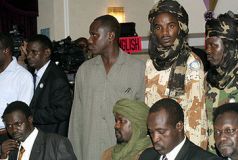Darfur deal “weak”, needs urgent UN force – ICG
June 20, 2006 (KHARTOUM) — A Darfur peace deal has “serious flaws” and only an urgent, robust U.N. peacekeeping mission will ensure it does not collapse and further divide the violent region, a think tank report said on Tuesday.
 An African Union-mediated May 5 peace deal for Sudan’s west was signed by only one of three rebel negotiating factions in the Nigerian capital Abuja.
An African Union-mediated May 5 peace deal for Sudan’s west was signed by only one of three rebel negotiating factions in the Nigerian capital Abuja.
Thousands in Darfur’s refugee camps have demonstrated daily against the accord saying it does not meet their basic demands and AU forces monitoring a shaky truce there have been attacked by angry and frustrated Darfuris.
“There is a very real danger that the international community, in its eagerness to get a deal, has brokered one that is structurally weak,” the International Crisis Group (ICG) said in a 19-page report.
“The document has serious flaws, and two of the three rebel delegations did not accept it,” it added.
Rebels who did not sign say it failed to give them enough political posts or compensation for war victims. They also want a role in monitoring the disarmament of Khartoum’s allied Arab militia, known locally as Janjaweed, who are blamed for much of the rape, murder and looting in the vast region.
“Sudan’s government conceded little during the Abuja negotiations to the demands of Darfur’s rebels for a greater share in national decision making and a fairer share of revenues for their region,” the report said.
It added the deal lacked methods of implementation and guarantees disarmament would take place.
Khartoum has signed five agreements over the past two years promising to disarm the Janjaweed. But it has done little, claiming Janjaweed are not militia but petty outlaws.
Under the peace agreement Sudan has until Thursday to present a plan to the AU to disarm proxy militias.
SEPT 30 DEADLINE
Tens of thousands have been killed and more than 2.5 million forced from their homes to miserable camps during three years of fighting in Darfur that the AU forces have been unable to stop.
The ICG said the AU should not extend the mandate of its struggling 7,000-strong force in Darfur beyond Sept. 30. Instead a rapid reaction U.N. force should be sent as the first component of a U.N. transition in Sudan’s remote west.
“It is critical that the transition to a U.N. force in Darfur occur on or around 30 September 2006,” the report said.
“The longer the takeover is postponed, the less legitimate the (accord) will become to many in Darfur, where there is already little confidence in it and in (the AU).”
Sudan rejects the U.N. mission saying it would attract foreign fighters and ignite an Iraq-style conflict.
Some critics say Khartoum objects because it fears U.N. soldiers may be used to arrest officials likely to be indicted by the International Criminal Court investigating alleged war crimes in Darfur.
A joint U.N.-AU technical team is in Sudan to assess the needs of a U.N. mission and how to support the AU during transition. But that mission has yet to garner public support from Sudan’s President Omar Hassan al-Bashir for U.N. troops.
Some Sudanese officials have said they do not object in principle to U.N. forces but would not accept a mandate which would empower U.N. peacekeepers to enforce the ceasefire.
The ICG said a Chapter VII mandate was essential.
“The brittle (deal) has such an array of possible spoilers that anything less than a large, full-fledged Chapter VII mission instructed to protect civilians and help implement the peace agreement would multiply the risk of failure of both the U.N. operation in Darfur and the peace process as a whole.”
(Reuters)
